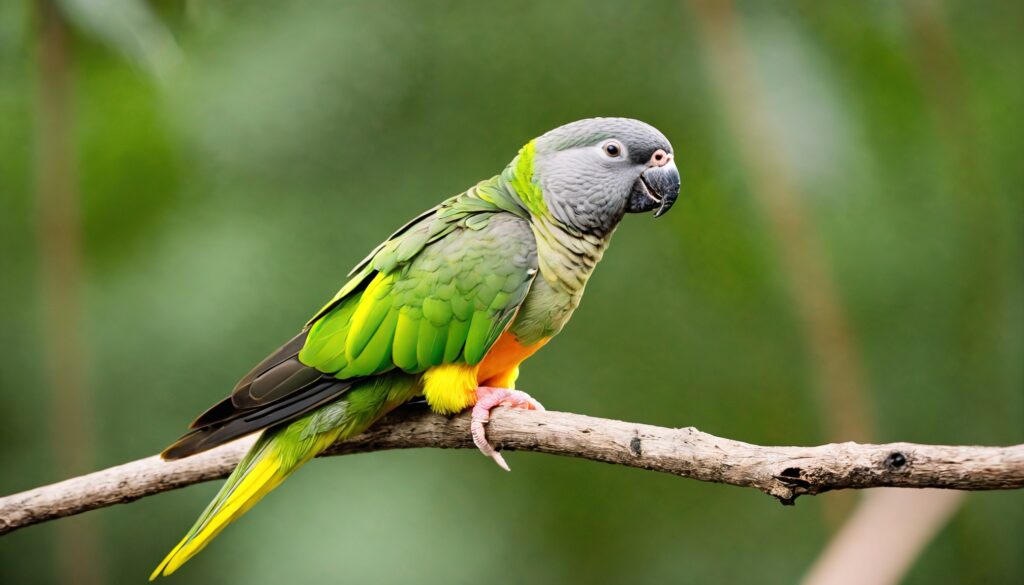When it comes to charming and intelligent avian companions, the Senegal parrot is a popular choice among bird enthusiasts.
Known for their vibrant personalities and striking appearance, these small parrots have captured the hearts of many.
If you’re considering adding a Senegal parrot to your family or are just curious about these fascinating birds, here are five fun facts you need to know!
1. What Are Some Fun Facts About Senegal Parrots
Senegal parrots (Poicephalus senegalus) are native to the woodlands and savannas of West Africa, particularly in countries like Senegal, Mali, and Guinea.
One of the most interesting facts about these parrots is their size—they are relatively small, typically measuring about 9 inches (23 cm) in length.
Despite their small stature, they boast a stunning appearance with a bright green body, yellow underbelly, and a distinctive “V” shape on their chest, which varies in color from yellow to orange.
Another fun fact is that parrots are known for their quiet nature compared to other parrot species.
They can be quite content sitting quietly on their perch, making them suitable for apartment living. However, they also have a playful side and enjoy interacting with their human companions.
2. How Smart Are Senegal Parrots
Senegal parrots are incredibly intelligent birds. They are quick learners and can be trained to perform various tricks and tasks.
Their problem-solving abilities are impressive, and they often enjoy puzzles and interactive toys that challenge their minds. This intelligence also means that they require regular mental stimulation to prevent boredom, which can lead to behavioral issues.
One way to keep a parrot mentally stimulated is through training sessions. These birds can learn to mimic sounds, recognize words, and even respond to commands. Their intelligence makes them highly trainable, but it also means they need an enriched environment to thrive.
3. Can a Senegal Parrot Talk
Yes, Senegal parrots can talk! While they may not have the extensive vocabulary of some larger parrot species, many Senegal parrots can learn to say a variety of words and phrases.
Their speech is often clear and easy to understand, and they can also mimic household noises like doorbells, phones, and even the sound of running water.
The ability to talk varies from bird to bird, with some parrots being more vocal than others.
They are also excellent at picking up on the tone of voice and can often imitate the emotional inflections of their owners.

4. They Are Strongly Bonded to Their Owners
Senegal parrots are known for forming strong bonds with their owners. They are affectionate birds that enjoy spending time with their human companions and can become very attached.
This bond is often so strong that parrots may become protective of their favorite person, sometimes displaying jealousy if others receive attention.
Because of their strong bonding nature, it’s important for potential owners to be prepared for a long-term commitment.
Senegal parrots can live for up to 30 years in captivity, so they require a dedicated owner who can provide the love and attention they need throughout their lives.
5. They Have a Distinctive Flying Style
Unlike some other parrot species, Senegal parrots are known for their unique flying style. They tend to fly in short bursts rather than sustained, long-distance flights.
This is partly due to their natural habitat in the wild, where they navigate through dense forests and woodlands.
Parrots like to fly from perch to perch or explore their surroundings in short flights.
Providing them with a safe space to fly and exercise is essential for their physical and mental well-being.

Conclusion
The parrot is a delightful and intelligent bird that makes a wonderful pet for those who can meet their needs. From their ability to talk to their strong bonding tendencies, these parrots are full of personality and charm.
Whether you’re captivated by their beauty or intrigued by their smarts, parrots are sure to bring joy and companionship to any bird lover’s home.
FAQs
1. What is the lifespan of a Senegal parrot?
Senegal parrots typically live between 25 and 30 years in captivity with proper care. Some have even been known to live into their early 40s, given a healthy diet, regular veterinary care, and a stimulating environment.
2. Are Senegal parrots good pets for beginners?
Yes, Senegal parrots can be a good choice for beginners, especially those who are willing to invest time in training and bonding.
They are relatively quiet, small in size, and highly intelligent, making them manageable for first-time bird owners. However, they do require daily interaction and mental stimulation.
3. Do Senegal parrots need a lot of attention?
Yes, Senegal parrots are social birds that thrive on interaction with their owners. They require daily attention, playtime, and mental stimulation to remain happy and healthy.
If left alone for long periods, they can develop behavioral issues like feather plucking or excessive vocalization.
4. What should I feed my Senegal parrot?
A balanced diet for a parrot should include a mix of high-quality pellets, fresh fruits, vegetables, and seeds.
Dark leafy greens, carrots, apples, and berries are great options. Avoid feeding them chocolate, avocado, caffeine, and any salty or sugary foods, as these can be harmful.
5. Can Senegal parrots live with other birds?
Parrots can sometimes get along with other birds, but they are known to be territorial and may not always get along with other birds.
It’s important to monitor interactions closely and ensure each bird has its own space to prevent any aggressive behavior.
6. How can I tell if my Senegal parrot is happy?
A happy Senegal parrot will be active, vocal, and engaged with its surroundings. Signs of happiness include playing with toys, exploring its environment, preening, and interacting positively with its owner.
If your parrot is eating well, showing interest in its surroundings, and displaying relaxed body language, it’s likely content.
7. How often should I take my Senegal parrot to the vet?
Regular veterinary check-ups are essential to ensure your Senegal parrots health. Its recommended to take your bird to an avian vet at least once a year for a wellness exam.
If you notice any changes in behavior, appetite, or droppings, its important to seek veterinary advice promptly.
8. Can Senegal parrots learn tricks?
Yes Senegal parrots are very intelligent and can learn a wide range of tricks, from waving and turning around to more complex behaviors like retrieving objects.
Positive reinforcement training works best, using treats and praise to encourage desired behaviors.
9. What should I consider before adopting a Senegal parrot?
Before adopting a Senegal parrot, consider their long lifespan, need for daily interaction, and potential for strong bonding with one person.
They require a significant time commitment, mental stimulation, and a safe, enriched environment. Ensure you’re prepared for the responsibility of caring for a parrot for many years to come.


3 thoughts on “Senegal Parrot: 5 Fun Facts You Need to Know”